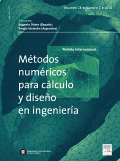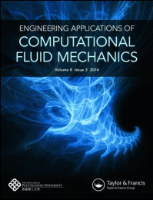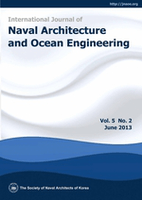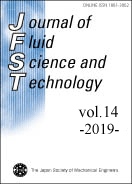
Journal of Naval Architecture and Marine Engineering
Scope & Guideline
Advancing the Frontiers of Naval Architecture
Introduction
Aims and Scopes
- Fluid Dynamics and Heat Transfer:
The journal emphasizes the study of fluid mechanics, particularly in marine contexts. This includes the analysis of heat transfer in various fluid systems, including nanofluids and MHD (Magnetohydrodynamic) flows, which are essential for understanding thermal management in marine applications. - Numerical and Computational Methods:
A significant portion of the research published focuses on numerical simulations and computational fluid dynamics (CFD). These methodologies are crucial for predicting fluid behavior under various conditions, optimizing designs, and enhancing performance in marine engineering. - Innovative Ship Design and Performance Optimization:
The journal explores advancements in ship design, including the use of artificial intelligence and optimization techniques to enhance fuel efficiency, reduce emissions, and improve overall vessel performance. - Marine Renewable Energy:
Research on the integration of marine renewable energy solutions, such as the reuse of offshore platforms and energy conversion technologies, is a growing focus area, reflecting the industry's shift towards sustainability. - Structural Analysis and Integrity:
The journal includes studies on the structural integrity of marine vessels, focusing on stress-strain analysis, hull design, and the impact of various environmental factors on marine structures.
Trending and Emerging
- Nanofluids and Enhanced Heat Transfer:
Research on nanofluids has gained traction, focusing on their unique properties and applications in marine environments. This emerging theme is critical for improving thermal management systems in naval applications. - Sustainability and Green Technologies:
The journal is increasingly publishing studies related to sustainability in marine engineering, particularly in relation to reducing greenhouse gas emissions and improving fuel efficiency in ship design, aligning with global environmental goals. - Artificial Intelligence in Engineering Design:
The integration of artificial intelligence in the ship design process is becoming a prominent theme. This reflects a growing trend towards leveraging AI for optimizing design parameters and enhancing decision-making in marine engineering. - Complex Fluid Interactions and Modeling:
There is a rising interest in complex fluid interactions, including MHD flows and non-Newtonian fluids. Research in this area is crucial for advancing the understanding of fluid dynamics in the context of modern marine applications. - Marine Renewable Energy Solutions:
The exploration of marine renewable energy sources, including the retrofitting of existing structures for energy production, is emerging as a vital area of research, highlighting the industry's shift towards sustainable energy practices.
Declining or Waning
- Classical Fluid Dynamics:
The focus on traditional fluid dynamics topics has waned, with a noticeable shift towards more complex fluid interactions involving nanofluids and MHD effects. This indicates a preference for innovative studies that incorporate modern materials and methods. - Experimental Studies:
There has been a reduction in purely experimental studies, with a greater emphasis on computational models and simulations. Researchers appear to be favoring theoretical approaches that leverage advanced computational techniques over traditional experimental methods. - Marine Vehicle Design without Computational Input:
Research focusing solely on conventional marine vehicle design without incorporating computational optimization techniques has seen a decline. The industry is increasingly relying on computational tools to enhance design efficiency and performance, leading to fewer publications in this area.
Similar Journals

International Journal of Heat and Technology
Illuminating the Path of Heat Transfer and Flow MechanicsThe International Journal of Heat and Technology is a premier academic publication dedicated to the dissemination of innovative research in the fields of thermal engineering, fluid mechanics, and condensed matter physics. Published by the INT INFORMATION & ENGINEERING TECHNOLOGY ASSOCIATION and based in Italy, this journal has been a significant resource for researchers and professionals since its inception in 1983, with a commitment to advancing knowledge until 2024. With an impact factor that reflects its relevance, the journal encompasses diverse topics within its scope, bridging gaps between theoretical research and practical applications. Although currently not open access, the journal provides valuable insights into the nuances of heat transfer, flow dynamics, and material properties, making it a critical reference for academia and industry alike. The journal's Scopus rankings position it within the competitive landscape of chemical and mechanical engineering, highlighting its contribution to advancing these fields. We invite scholars, professionals, and students to engage with the rich content provided within its pages, to foster a deeper understanding of heat and technology in our rapidly evolving world.

CHINA OCEAN ENGINEERING
Exploring the Depths of Ocean InnovationCHINA OCEAN ENGINEERING, published by SPRINGER MEDIZIN VERLAG GmBH, is a prominent journal in the fields of Mechanical Engineering, Ocean Engineering, and associated environmental sciences. With its ISSN 0890-5487 and E-ISSN 2191-8945, this journal caters to a broad audience engaged in research and development related to ocean systems and technologies. As evidenced by its Q2 ranking in Mechanical Engineering and Ocean Engineering, as well as its Q3 placement in Oceanography and Renewable Energy, Sustainability and the Environment for 2023, it provides a critical platform for disseminating innovative research and progressive ideas in these dynamic and interdisciplinary fields. The journal is committed to advancing the science of ocean engineering by focusing on sustainable practices and technological advancement, making it an essential resource for researchers, professionals, and students alike. With contributions from leading experts worldwide, CHINA OCEAN ENGINEERING is dedicated to exploring the multifaceted challenges and opportunities presented by our oceans.

Thermal Science
Unveiling the science behind renewable energy systems and their impact.Thermal Science is an esteemed open-access journal published by the Vinca Institute of Nuclear Sciences in Serbia. With a rich focus on the field of thermal science, this journal has established itself as a vital resource for researchers and professionals interested in the dynamics of energy, renewable energy systems, and environmental sustainability. Since its inception in 2001, Thermal Science has dedicated itself to disseminating high-quality research that addresses the challenges of contemporary thermal technologies. The journal has converged its years of publication from 2007 to 2024 and currently holds a Q4 ranking in the category of Renewable Energy, Sustainability, and the Environment, with a Scopus rank of #172 out of 270, placing it in the 36th percentile. This makes it a crucial platform for sharing innovations and findings that contribute to the development of sustainable energy solutions. With open access options available, Thermal Science ensures that knowledge is readily accessible, fostering collaboration and advancement in this critical field.

Revista Internacional de Metodos Numericos para Calculo y Diseno en Ingenieria
Connecting Scholars to Shape the Future of EngineeringRevista Internacional de Metodos Numericos para Calculo y Diseno en Ingenieria is a prominent academic journal dedicated to the dissemination of innovative research and methodologies in the fields of applied mathematics and engineering. Published by SCIPEDIA S L in Spain, this journal has been an essential resource for researchers since its inception in 1987, transitioning to an Open Access model in 2016 to enhance accessibility and foster collaboration among professionals and academics globally. Currently indexed in Scopus, it holds a Q4 category designation in both applied mathematics and miscellaneous engineering fields for 2023, reflecting its focus on advancing numerical methods to solve engineering problems. Despite ranking at the lower percentile, it serves as a vital platform for emerging scholars and practitioners aiming to contribute to cutting-edge developments in numerical techniques and engineering design. The journal's commitment to providing a forum for new ideas makes it an invaluable asset for students, researchers, and industry professionals seeking to stay abreast of advancements in the discipline.

INTERNATIONAL JOURNAL OF OFFSHORE AND POLAR ENGINEERING
Navigating the Depths of Engineering ExcellenceINTERNATIONAL JOURNAL OF OFFSHORE AND POLAR ENGINEERING, published by the International Society of Offshore and Polar Engineers, is a prominent academic journal dedicated to advancing research in key engineering disciplines such as Civil, Mechanical, and Ocean Engineering. Established in 1991, the journal caters to a global audience, providing an essential platform for disseminating innovative findings and case studies pertinent to offshore and polar environments. With a focus on practical and theoretical applications, the journal ranks in the Q3 category across its relevant fields as of 2023, reflecting its significant contribution to civil and structural engineering, mechanical engineering, and ocean engineering. Although it does not offer open access, its rigorous peer-review process ensures that only high-quality research is published, making it a critical resource for researchers, industry professionals, and students invested in the dynamics of offshore and polar engineering. The journal's commitment to exploring emerging challenges and technological advancements underlines its importance in shaping the future of engineering practices in some of the world's most extreme environments.

INTERNATIONAL JOURNAL OF HEAT AND FLUID FLOW
Championing Rigorous Research in Heat Transfer and Fluid DynamicsFounded in 1979, the INTERNATIONAL JOURNAL OF HEAT AND FLUID FLOW is a premier publication in the fields of mechanical engineering, fluid dynamics, and heat transfer, published by Elsevier Science Inc. With an impressive impact factor and ranking in the Q1 category for Mechanical Engineering and Q2 for Condensed Matter Physics and Fluid Flow and Transfer Processes, this journal is highly regarded for its rigorous peer-reviewed articles that contribute significantly to the advancement of knowledge in these critical areas. Researchers, professionals, and students can access cutting-edge studies that explore the intricacies of thermal and fluid systems, ensuring they stay at the forefront of scientific exploration. The Scopus rankings further affirm its role as a leading source of impactful research, with significant placements in crucial academic categories. Join an active community of scholars committed to innovation and excellence in the exploration of heat and fluid flow phenomena.

Engineering Applications of Computational Fluid Mechanics
Exploring the Frontiers of Computational Fluid MechanicsEngineering Applications of Computational Fluid Mechanics is an esteemed journal published by Taylor & Francis Ltd that serves as a vital resource for researchers, professionals, and students in the field of fluid mechanics and its computational applications. With an ISSN of 1994-2060 and an E-ISSN of 1997-003X, this journal has established its reputation through its rigorous peer-review process and commitment to Open Access since 2015, facilitating widespread dissemination of cutting-edge research. Based in the United Kingdom, the journal is indexed in leading databases and has achieved a significant impact in its categories, ranking in the top quartile (Q1) for both Computer Science (miscellaneous) and Modeling and Simulation as of 2023. Notably, its Scopus rankings place it in the top 4% of Mathematics/modeling and simulation, highlighting its importance in advancing knowledge and innovation within the discipline. The journal invites contributions that explore both theoretical and practical aspects of computational fluid dynamics, fostering collaboration and intellectual growth within the community.

International Journal of Naval Architecture and Ocean Engineering
Navigating the forefront of oceanic research and technology.International Journal of Naval Architecture and Ocean Engineering is a premier academic journal dedicated to advancing the fields of naval architecture and ocean engineering. Published by the SOC NAVAL ARCHITECTS KOREA, this Open Access journal has been a vital resource for researchers and industry professionals since its founding in 2009, providing unrestricted access to high-quality, peer-reviewed articles. With a notable Q2 ranking in both Control and Systems Engineering and Ocean Engineering, it ranks among the top journals in its category, offering valuable insights into emerging technologies and methodologies. The journal’s reputation is further highlighted by its Scopus rankings, positioning it within the top 30% of journals in Ocean Engineering and the top 31% in Control and Systems Engineering as of 2023. Based in the vibrant academic hub of Seoul, South Korea, the journal invites manuscripts that explore innovative solutions and critical research to address the challenges in naval and oceanic environments, contributing to the global dialogue on sustainable maritime practices.

Brodogradnja
Empowering Knowledge in Mechanical and Naval EngineeringBrodogradnja is a distinguished open-access journal dedicated to the fields of Mechanical Engineering and Naval Architecture, published by the University of Zagreb's Faculty of Mechanical Engineering & Naval Architecture. Since its launch, the journal has been at the forefront of disseminating valuable research and advancements in engineering design, marine technology, and shipbuilding practices, contributing significantly to both academic literature and industrial applications. With an impressive Q1 ranking in Mechanical Engineering and a Q2 ranking in Ocean Engineering for 2023, it stands as a pivotal resource for researchers, professionals, and students alike. Moreover, the journal's commitment to open access since 2005 ensures that cutting-edge research is accessible to a global audience, facilitating collaboration and knowledge-sharing among experts in the field. Based in Croatia, Brodogradnja continues to uphold the legacy of high-quality technical scholarship and innovation, making it an essential platform for advancing marine engineering and related disciplines.

Journal of Fluid Science and Technology
Exploring Innovations in Fluid MechanicsThe Journal of Fluid Science and Technology, published by the Japan Society of Mechanical Engineers, serves as a pivotal platform for the dissemination of cutting-edge research in the fields of fluid mechanics and mechanical engineering. With an ISSN of 1880-5558, this Open Access journal has been dedicated to advancing the understanding of fluid flow and transfer processes since its establishment. As of 2023, it holds a significant position with a Q3 quartile ranking in both Fluid Flow and Transfer Processes and Mechanical Engineering categories. Researchers and practitioners are encouraged to explore the journal’s extensive collection of articles, contributing to the body of knowledge that impacts various practical applications in engineering and technology. The journal, which has established a reputation for quality amidst a competitive landscape, further fosters international collaboration and education by providing unrestricted access to its content. For professionals and students alike, the Journal of Fluid Science and Technology represents an invaluable resource for the latest findings and innovations in fluid dynamics and mechanical systems.